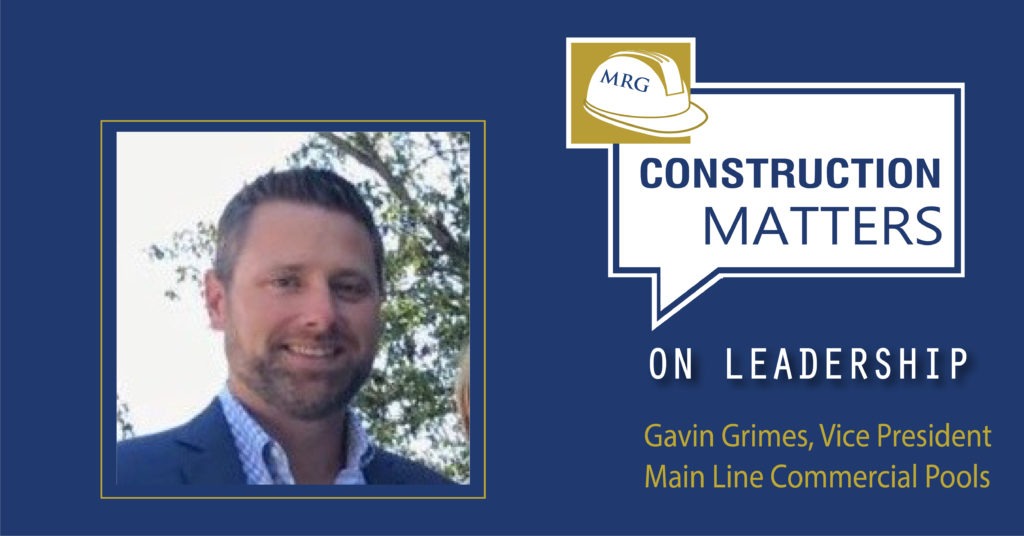It started as a one-man operation, servicing residential pools in the Main Line area—opening them for the season, cleaning them, maintaining equipment and closing them. Gary Grimes launched Main Line Pools in 1973, ultimately diversifying into chemical and equipment distribution for individual and commercial swimming pools. In 2004, Gary’s sons, Gavin and Michael, launched the commercial pool construction business which has designed, built and serviced more than 200+ commercial aquatic facilities in the Mid-Atlantic region.
We spoke to company Vice President Gavin Grimes about changing the business model, the importance of safety, and what prospective employees and business owners need to know about getting ahead in construction.
Tell us about your role as vice president.
We’re a family-owned company with three brothers running the business. Each of us has separate responsibilities but we make strategic decisions as a team. It works for us. My role involves finance, administration, project estimating, and insurance. My brother Michael runs all our Construction projects and my other brother, Brian, runs our Water Management and Service division.
How did you achieve where you are today?
Becoming vice president was a natural progression. I’ve been in the business my whole life including working in the warehouse and in the field when I was growing up. After college, I started selling service contracts and after-market equipment in the commercial service division. When Michael and I started the commercial construction division—that was a milestone for me personally, and for the company.
Why did you decide to diversify into construction?
The service business wasn’t generating the revenue we wanted and at the same time, there were a lot of inquiries coming in about construction. We looked at the competitive landscape and saw opportunity, so we hired the best pool construction experts we could find and took it from there. We started with 10 – 12 employees and generating $3 – $4 million in revenues. Today we have 60 employees with $25 million in revenues.
What does it take to be successful at the top of any organization?
Being a leader is a must. Having a calm disposition through adversity is important. It’s also important to not take things for granted. You can only do so much on your own; your employees are the backbone of your business, so you need to treat them the way you want to be treated.
What do you look for in employees?
People who are reliable, service oriented and team-oriented We have found that the most successful employees are the ones that strive to keep learning and are willing to pitch in where help is needed. That is critical in a developing business.
How would you describe the company culture?
There is definitely a “family” vibe in that we feel all of our employees are extensions of our family. I would also say that we have a “can do” atmosphere. There isn’t anything our company and employees can’t figure out or accomplish together. Communication is key. So is respect. People have a lot of pride in their work and in the company.
COVID-19 has changed business for everyone. What’s your experience been like?
From a business perspective, we are fortunate that most of our jobs are considered essential and we have a good amount of work in the pipeline. One of the biggest challenges was getting PPE and staying on top of COVID policies which differed from state to state. Personally, I think the most difficult part was the thought of our employees getting sick; you really can’t be prepared for that.
You have three safety provisions listed on your website: Mindfulness. Empowerment. Training. Why?
These are the three things we always want employees to remember when they’re working. It’s important to us that our team members are safety minded and prepared. They are all OSHA trained – from the newest to the most seasoned. We want our people to be successful on the job and working safely is imperative. We also want our employees to do their jobs as if it’s their own business. We want them to be mindful of their actions and take pride in their craft.

